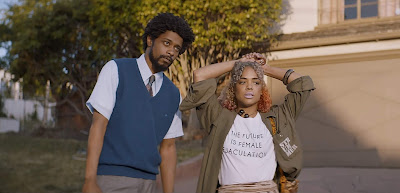Sorry to Bother You
Sorry to Bother You - A Crazy New World
In Brave New World, Aldous Huxley describes a stratified dystopic society where dim-witted workers are genetically engineered and instructed through subliminal messages to live happily under servitude, producing for a highly intelligent elite. In Sorry to Bother You, Boots Riley proposes a similar dystopic world, or the beginning of such a world, creating a smart commentary of our current world, which is moving closer and closer every day to that dystopic Utopia of Brave New World. In an insane film with hallucinatory visuals and a beyond-awesome soundtrack by The Coup, Riley shows us how crazy our world really is, commenting on racism, classism, and capitalism. And he shows us that it's not a "brave new world" we're leaving in - it's a crazy new one filled with greed-induced insanity.
Sorry to Bother You is the title, as if Boots Riley is asking us politely to disrupt our lives as he reveals some truths with the story of a telemarketer living in Oakland who sees himself enter a world of money and greed. His name is Cassius Green, which is already an intelligent play on words – “cash is green” – who is brilliantly portrayed by Lakeith Stanfield. He lives with his girlfriend, Detroit, who is probably the character in film history (and history in general) with the most awesome earrings ever, who is played also amazingly by Tessa Thompson. Cassius is just a regular guy trying to survive in this crazy world and trying to find a meaning for his life. We are introduced to him in an awkward and hilarious job interview for a Telemarketing company, Regal View, where he is accepted and starts working- Immediately, we are introduced to the concept of S.T.T.S – Stick to The Script. We are also introduced to a strange concept – the Power Caller – a group of highly talented telemarketers that earn much more money and have access to their own elevator. Don’t these concepts start to ring some bells? Aren’t they already very similar to the stratified society of Brave New World? This is because these concepts tell us the following: that capitalism is a system that demands stratification and conformity with the system in society. Stick to the script! Working inside the system is the only way to success and self-realization!
Sorry to Bother You is one of the most important films of this year. It reveals so many truths of the world with its surrealist, dystopic and highly stylized ambiance. Sometimes what is crazier is what reveals more truth of our reality. Boots Riley brilliantly crafts an extremely intelligent screenplay that is both entertaining and contains more layers than I was able to cover here. Many Ph.D. theses could be written about it, exploring all its layers of criticism of our current world of capitalism. With a twist in the end that most blatantly symbolizes the revolt of the working class against capitalism, this is a truly revolutionary work of art that hopefully wakes many people to the reality we live in, where a company using slave equisapiens isn’t that crazy of an idea. Again, it’s a crazy new world we live in.
Sorry to Bother You is one of the most important films of this year. It reveals so many truths of the world with its surrealist, dystopic and highly stylized ambiance. Sometimes what is crazier is what reveals more truth of our reality. Boots Riley brilliantly crafts an extremely intelligent screenplay that is both entertaining and contains more layers than I was able to cover here. Many Ph.D. theses could be written about it, exploring all its layers of criticism of our current world of capitalism. With a twist in the end that most blatantly symbolizes the revolt of the working class against capitalism, this is a truly revolutionary work of art that hopefully wakes many people to the reality we live in, where a company using slave equisapiens isn’t that crazy of an idea. Again, it’s a crazy new world we live in.
However, sticking to the script isn’t enough for Cassius to be successful – as it isn’t for any non-white person. He still can’t make any deals with the company’s clients. He discovers, through a colleague called Langston – played by Danny Glover – that he must use his “white voice” if he wants to succeed in the company. This is both an extremely comedic plot-point and a metaphor to how black people, and non-white people in general, have to “become white” in order to be successful. This has to do with W.E.B. Du Bois’ concept of “African-American Double Consciousness”, which refers to the conflict that exists inside every African-American between their identity as someone with African ancestry and their identity as someone raised in a racist European-majority society. If a black person wants to be successful in this society, they have to make themselves in the image of the White Man. This is because being white in our society isn’t a race, it’s a statute. It’s referenced in the film how, 60 years ago, Italian-Americans weren’t considered white in the US. Eventually they “earned” their place in the privileged position of the White Man in a White-Majority society. This is a symptom of the stratification of society discussed by Huxley throughout his literary work. Western society is stratified by the idea of race, with black people having to abandon their “blackness” and become “white” in order to move up the social ladder.
Another extremely interesting aspect presented in this brilliant film is a company called “Worry-Free”. This company bases itself on the promise of giving guaranteed employment, guaranteed housing and no more worries to workers who apply to its program. They won’t have to worry about anything because their lives will be taken away from them as they are turned into slaves. However, this slavery is hidden and government-supported – we are shown throughout the film in newspapers and TV news programs that both democrats and republicans support Worry-Free, showing that both sides are really in the same side. This is a commentary on what happens in many factories, mines, etc owned by big multinational companies all over the world, where they employ workers with almost null salary and inhumane working conditions. It’s an envisionment of what really happens taken to an absurd extreme that, however, is a plausible and very real extreme.
However, there is a force to counter the greed of the powerful – unions. Cassius is approached by Squeeze – played by Steven Yeun – during lunch break and is invited to form a union so that everyone in Regal View gets better payment. Although enthusiastic at first, Cassius’s ambition eventually corrupts him. When the strikes to happen, Cassius is offered a promotion to become a Power Caller. But what do Power Callers sell? As we find out they sell power – fire-power and manpower, which is weapons and slaves (what else would make so much money?) This is when Cassius starts to spiral out of control in his ambition for wealth. He wants to become wealthy so he can provide for his girlfriend and become a better human being, but, as Detroit tells him, he becomes morally emaciated – because money can’t make people better. The only way to make real money is through the exploitation of people because money is exploitation.
And as Cassius delves more into his money-induced corruption he delves more into his “whiteness” and distances himself from his friends. As he becomes more successful, he becomes more white and out of touch with the reality of his community – something that happens with a lot of successful black celebrities and businessmen – which is noticeable in the fact that he starts to talk in his “white voice” without noticing and the white walls and fabrics of the apartment he buys, which reflects how he is forsaking his “blackness”.
However, it’s in the final act that things turn around and really turn bat-shit crazy. Cassius falls down the rabbit hole of capitalism and sees it by what it really is. He is invited to come to a party hosted by Steve Lift, the CEO of Worry-free – played incredibly by Armie Hammer. We are introduced to this character as he is snorting one of the longest lines of cocaine I have ever seen on film, which reflects the hyperactivity in the nature of capitalism. In this party, we see a white male-dominated world with all its veils completely removed, with the display of objectifies and commodified female bodies and the blatant racism portrayed in one of the most hilarious scenes of the film, where Cassius is forced to rap because “all black people know how to rap, right?”
In this party, Lift presents Cassius with a revolutionary plan that would revolutionize labor and life itself in the form of genetical enhancement of Worry-free workers, which would turn them into equisapiens – half-horse, half-human people – that would be more efficient in producing goods and therefore be more profitable. This is when the veil of capitalism is completely torn apart and the repulsive rot of greed within it is completely revealed to Cassius – and us. Capitalism doesn’t care about human rights, it only cares about profit. And if it’s more profitable to enslave and turn people into equisapiens, then off goes the human rights out the window. Capitalism is cold, hard profit – that’s all it is and that’s all it cares about. It’s in this moment that Cassius realizes what he has done and tries to redeem himself.
And so, he goes on a journey to reveal this to the world, taking a video that reveals the equisapiens to the nation’s most widely watched show. However, people are too numbed to care, preferring to turn the scandal into a fun trend. This is a commentary on the way that people are easily numbed to the point of no compassion with others and how the system is able to take things critical to it around into a product to sell and consume. So, Cassius and his friends (now reunited) need to show people “how to give a fuck”. They prepare a protest in front of Regal View that goes violent, with Cassius ending up being knocked out and arrested. However, Cassius has a trick up his sleeve – he released the equisapiens. It’s a double-edged sword to pump your workers, because as they may bring you more profit, they also may become less controllable and stronger. And so, we are left with an empowering message. We have to fight against the system and our oppressors, we can’t work within the system and can’t give up on our identity t become successful. Mostly because that success won’t even matter – what will matter is what we contribute to what Huxley calls “man’s Final End” rather than the Greatest Happiness principle (do whatever brings more happiness). And so, we have to start fighting somewhere.




Comments
Post a Comment